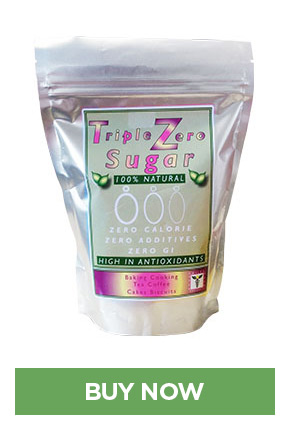Stevia sweeteners are based upon extracts from the leaves of the stevia rebaudiana plant, and was approved for sale in the EU in 2012.
Until 2012, stevia had not been approved for sale in the EU and its availability had been eagerly anticipated by people with diabetes looking to have a naturally derived low calorie sweetener.
Stevia’s sweetening effect
Steviol glycosides, the compounds which give stevia its sweet taste, have a level of sweetness graded at 250-300 times sweeter than sugar (sucrose).
Steviol glycosides, whilst sweet, can have a bitter aftertaste when stevia is consumed in its purest form. [86]
Stevia and effect on blood sugar levels
Using pure stevia preparations in relatively small amounts should have no significant effect on blood glucose levels
A research study from Brazil, published in 1986, showed that taking stevia preparations at 6 hour intervals over 3 days helped to significantly improve glucose tolerance
The study will be welcome news for people with diabetes, particularly those with insulin resistance , although it should be noted that the study was small, with 16 participants in the study.
Stevia based sweeteners that are blended with other sweetening ingredients may have blood glucose raising properties, depending on what they are blended with and in what proportion.
Refer to the packaging or contact the manufacturer if you have questions about how the product may affect your blood glucose levels.
Stevia extracts are free from calories so can be beneficial for weight loss if used as an alternative to sugar.
Why are some stevia products blended with other sweeteners?
As stevia extracts can have a bitter aftertaste, a number of commercially available stevia based sweeteners blend in other sweeteners to improve the taste.
Stevia sweeteners may include any of the following additional sweetening ingredients:
- Dextrose
- Maltodextrin
- Sugar (sucrose)
- Sugar alcohols
- Natural flavourings
If you are looking to avoid particular sweeteners, check the ingredients list before purchasing or consuming.
Some brands of stevia may also vary the ingredients between different forms of the product, eg products listed for baking may contain sugar when products for sprinkling on food or drink may use non-sugar sweeteners.
Uses of stevia
Stevia is a useful sweetener for hot and cold drinks and can be sprinkled over foods for instant sweetness.
Stevia can be used in cooking, particularly where the primary role of stevia is to add sweetness. Stevia does not caramelise and may not function so well as a direct substitute for sugar in recipes in which sugar is an integral part of the structure or texture.
The suitability of stevia in baking may vary depending on the ingredients of the stevia product itself. Some stevia products have been formulated specifically for baking , however, it is advisable to check whether these will be suitable for your sugar levels as they may contain sugar.
Health benefits of stevia
Stevia is recognised as having properties which may result in the following health benefits: [87]
- Blood glucose lowering
- Blood pressure lowering
- Anti-inflammatory
- Anti-tumour
- Anti-diarrheal
Triple Zero Stevia Sugar
Triple Zero Stevia Sugar is a natural sweetener produced using a combination of pure Stevia and Erythritol, a naturally occurring nectar (sugar alcohol) found in some fruits
It has no calories or additives, making it a suitable alternative to sugar for cooking and baking foods where sucrose (table sugar) is an ingredient. It can also be used to sweeten coffee , tea , and other hot or cold drinks , as well as sugar-free cereals and other foods.
What is Erythritol?
Erythritol is a sugar alcohol found naturally in certain fruits. It is safe to use, less sweet than sugar, and in practical terms has no calories, no additives, and a zero GI ( glycaemic index ). Unlike other sugar alcohols, it also has no significant laxative effect on the body.
Unique blend
000 Stevia Sugar combines these two ingredients to produce a 100% natural sweetener which balances the sweetness of pure Stevia and removes the slight after taste it can leave, while providing a number of health benefits (see below).
Is it suitable for people with diabetes?
High in antioxidants and with zero calories and a zero glycaemic index, the producers of 000 Stevia Sugar claim it does not increase blood sugar levels or cause weight gain, making it highly beneficial for management of obesity and diabetes without impacting lifestyle choices. It also has no additives and has been shown to have none of the negative side effects of many sweeteners on the market.
In animal studies, Stevia has been shown to have a greater impact on reducing blood glucose than the diabetes drug glibenclamide.
Who else can benefit from 000 Stevia Sugar?
As well as being diabetes-friendly, 000 Stevia Sugar is also known to be helpful for people struggling with:
- Obesity
- Dieting and weight management
- Tooth decay
- Sugar addiction
Health risks and warnings
Research studies, including a Brazilian study from 2007, have suggested that stevia may raise the risk of cancer. However, other studies have shown no side effects.
Because of potential blood glucose lowering effects, it is advisable for people with diabetes, on treatments that raise the risk of hypoglycemia, to test blood sugar levels to determine whether or not stevia is having a blood glucose lowering effect
How long has stevia been legally available for sale in the UK?
Stevia was approved for use as a sweetener in the EU and UK in December 2011. The EU regulations permit which products may contain stevia and at what quantities.






